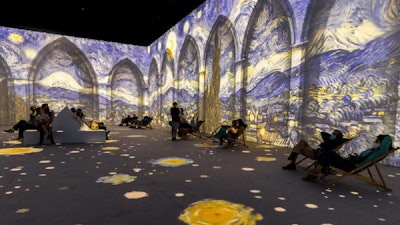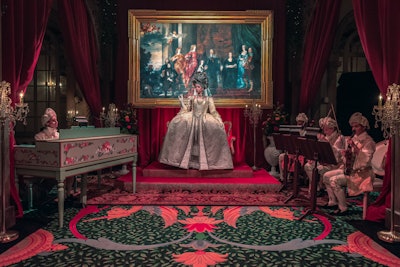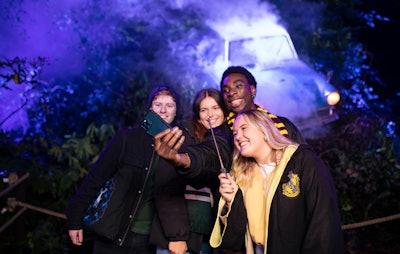
The “Netflix of experiences”—that’s how Mariano Otero, the vice president and general manager of Americas at Fever, describes the event discovery platform. Just like the streaming service recommends shows based on your past viewing history, Fever wants to do that for live events and experiences.
Started in 2014, and currently boasting around 1,000 employees, Fever was based on the idea that “there had to be a better way to discover things that were happening in your city,” Otero said. Right now, it’s operating in more than 60 cities across Europe, America, Asia, and Oceania. Early last year, the platform raised $227 million in funding; it was valued at over $1 billion.
In addition to the Fever app and website, folks can also engage with the Secret Media Network, another leg of the company, that includes hyperlocal websites featuring news, events, and things to do in cities around the world, along with corresponding branded Instagram accounts like @secret_nyc. “It's really sort of your guide to the city, and that is what Fever wants to be,” Otero said.
While the platform is free for users—with no additional ticket fees—event organizers do pay a commission fee when listing on Fever. That’s because the company has been able to collect hundreds of millions of data points on what people like and don't like. That proprietary data not only includes what events people are buying tickets for, but also what they are browsing, showing interest in, or adding to cart. This information, which is collected across all of Fever's channels, has proven to be a valuable asset for event and experience producers.
 The Queen’s Ball: A Bridgerton Experience, an event based on the Netflix series, initially launched in Los Angeles, Chicago, Montréal, and Washington, D.C. before expanding across the world.Photo: Federico Imperiale
The Queen’s Ball: A Bridgerton Experience, an event based on the Netflix series, initially launched in Los Angeles, Chicago, Montréal, and Washington, D.C. before expanding across the world.Photo: Federico Imperiale
For example, Fever identified that there was going to be big demand for the Van Gogh: The Immersive Experience in 2020 and 2021, which led them, in conjunction with producer Exhibition Hub, to launch the experience in more cities. “We have the partners, we have the content, and we have the platform to get the information that is helping us make those decisions,” Otero said.
One recent exhibition, Mexican Geniuses: A Frida and Diego Immersive Experience, came about from an existing partnership in Mexico City. Fever helped tech firm Brain Hunter bring the experience to life by identifying that there would be demand for it in markets, including Washington, D.C. where it launched in August.
While the data component is important in helping Fever to forecast potential demand, Otero pointed out that other variables such as availability of venues also play a factor in determining markets. For example, the rights to use Frida Kahlo images for the Mexican Geniuses exhibit were granted on a city-by-city basis. “Ultimately, we try to look at it holistically and try to understand and anticipate what we think is going to happen with demand and what we think is going to happen with the overall P&L of the experience,” Otero said.
He estimates that around 20 million people have gone to some type of Van Gogh experience. (There are several happening simultaneously throughout the U.S.) The Van Gogh: The Immersive Experience is still taking place in cities like New Orleans, Albany, Raleigh, Sacramento, Cincinnati, and Miami, illustrating the steady interest in such an event.
 For the Harry Potter: A Forbidden Forest Experience, Fever worked with production agency Thinkwell Group to bring the event to Leesburg, Va.; Westchester, N.Y.; Groenenberg, Belgium; and Cheshire in the U.K.Photo: Courtesy of WIZARDING WORLD and all related trademarks, characters, names, and indicia are © & ™ Warner Bros. Entertainment Inc. Publishing Rights © JKR. (s22)
For the Harry Potter: A Forbidden Forest Experience, Fever worked with production agency Thinkwell Group to bring the event to Leesburg, Va.; Westchester, N.Y.; Groenenberg, Belgium; and Cheshire in the U.K.Photo: Courtesy of WIZARDING WORLD and all related trademarks, characters, names, and indicia are © & ™ Warner Bros. Entertainment Inc. Publishing Rights © JKR. (s22)
He added that he thinks virtual reality and 3D mapping will play bigger roles in immersive experiences going forward, but that it’s not all about tech. “I think if anything, we're all looking for an experience that's going to take us off our phones, that's going to engage us,” he said. “I think that the engagement can sometimes come from doing things that are more analogous and less technological.”
And despite the recent surge in popularity of virtual spaces like Fortnite, Otero said that he thinks that “people’s willingness to connect, the desire to connect is still there. I think that's why we're still seeing such a strong demand for these types of experiences, and I think that that's not going to go away.”
 The outdoor experience brings to life iconic forest scenes from the Harry Potter films.Photo: Courtesy of WIZARDING WORLD and all related trademarks, characters, names, and indicia are © & ™ Warner Bros. Entertainment Inc. Publishing Rights © JKR. (s22)
The outdoor experience brings to life iconic forest scenes from the Harry Potter films.Photo: Courtesy of WIZARDING WORLD and all related trademarks, characters, names, and indicia are © & ™ Warner Bros. Entertainment Inc. Publishing Rights © JKR. (s22)



















